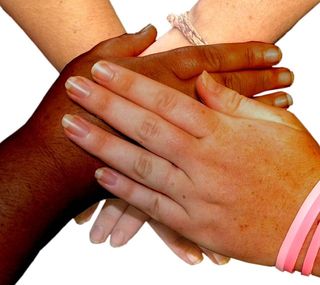
At the 2016 Democratic National Convention last week, President Obama crafted his speech around a central theme. He challenged us “to reject cynicism and to reject fear, and to summon what is best in us…” He called us to love, to hope, and to work together for the common good. He made a bold move in the cynical psychological and political climate of today’s world so consumed with fear: he made a case for belief in goodness.
Now we all know that fear is a powerful motivator. In my work as a psychoanalyst, I see every day what fear does to people. I see how it makes people feel trapped, promotes defensiveness and violence, and fundamentally stymies growth and development. It might even be said that the work of psychotherapy and psychoanalysis is to help people shift from an internal psychological culture dominated by fear, defensiveness, and hostility to one characterized by trust, hope, and love. Maybe this is the reason why President Obama’s speech made me sit up and pay attention.

It is important to understand how fear and cynicism are related. Cynicism is related to fear because it offers the promise of protection, which is a deep human need. The way that it offers protection is simple: it promises to keep out the danger. The rules of cynicism are simple and straightforward: trust no one; don’t believe anything; close ranks; keep your guard up and your head down; keep your door locked and your weapons at the ready. Danger: do not enter.
Because of its appeal as a protection from danger, cynicism has gained a lot of ground and respect in our culture today. Sometimes I think that it has even been promoted to virtue status. Cynical people are seen as smart, strong-minded, independent thinkers. Cynical people are viewed as realistic, scientific, and even cool.
To make the same observation in a different way, our society has a very cynical view of people who believe in goodness. If you look for the good in others and try to lend a helping hand, you are viewed as naïve, a bleeding heart. If you tend to see the glass as half full, you are seen as weak and silly. Trusting in the goodness of others makes you a Charlie Brown: foolish and gullible, good only for a laugh. The cynic may even double down and suggest that such an open-hearted attitude is danger’s playground—you might as well give the enemy the keys to your front door.
While cynicism is so often idealized, in practice it fails to fulfill its promise of protection in any lasting way. Instead, it tends to galvanize the very danger it is trying to protect us from. When we are so quick to view the other as the enemy, danger festers and grows. When we lock our doors and turn away from encounters with other people, our fearful projections multiply and we have no real experience to counter them. When we live in mistrust, we look for the worst in other people and respond in kind.
The cost of cynicism is great. It blocks change. It burns bridges. It builds walls. It undermines good will. It sinks compromise. It escalates conflict. We hear about it every week in the news. I hear about it every day in my psychotherapy office. A sour look, a cross word, or a poorly worded communication is used as evidence of betrayal and lends strength to isolation, depression, and discord. A misunderstanding becomes an avenue to violence. A traffic stop becomes a powder keg. Where there is no trust, there is no way to build something truly constructive, secure, and good.

In the 1950’s, British psychoanalyst Melanie Klein wrote that belief in goodness is the foundation for the health of an individual and a society. She believed that we are born with the capacity for this attitude but that it must be developed, slowly over time. Repeated positive experiences are crucial for this to happen. When we take the risk of believing in goodness and receive a positive response, then inner security begins to grow. But Klein knew full well that disappointment, hurt, and loss are part and parcel of real human relationships. She observed what might seem to us unexpected and paradoxical: that belief in goodness becomes stronger in the face of painful experiences when we work through them together. When people work to repair and recover from their difficulties, they actually build safer, more secure psyches, relationships, and societies. They become resilient and, as President Obama suggested, stronger together.
Whatever we may think about the particulars of the 2016 U.S. presidential election, I hope that President Obama’s speech will get us thinking about our core values—as a society and in our personal lives. Cynicism will take us one direction and belief in goodness will take us in another. Whichever path we follow, it may be one of the biggest decisions we ever make.
Copyright 2016 Jennifer Kunst, Ph.D.
Like it! Tweet it! Share it!
To learn more, check out Jennifer’s website at www.drjenniferkunst.com and her book, Wisdom from the Couch: Knowing and Growing Yourself from the Inside Out




